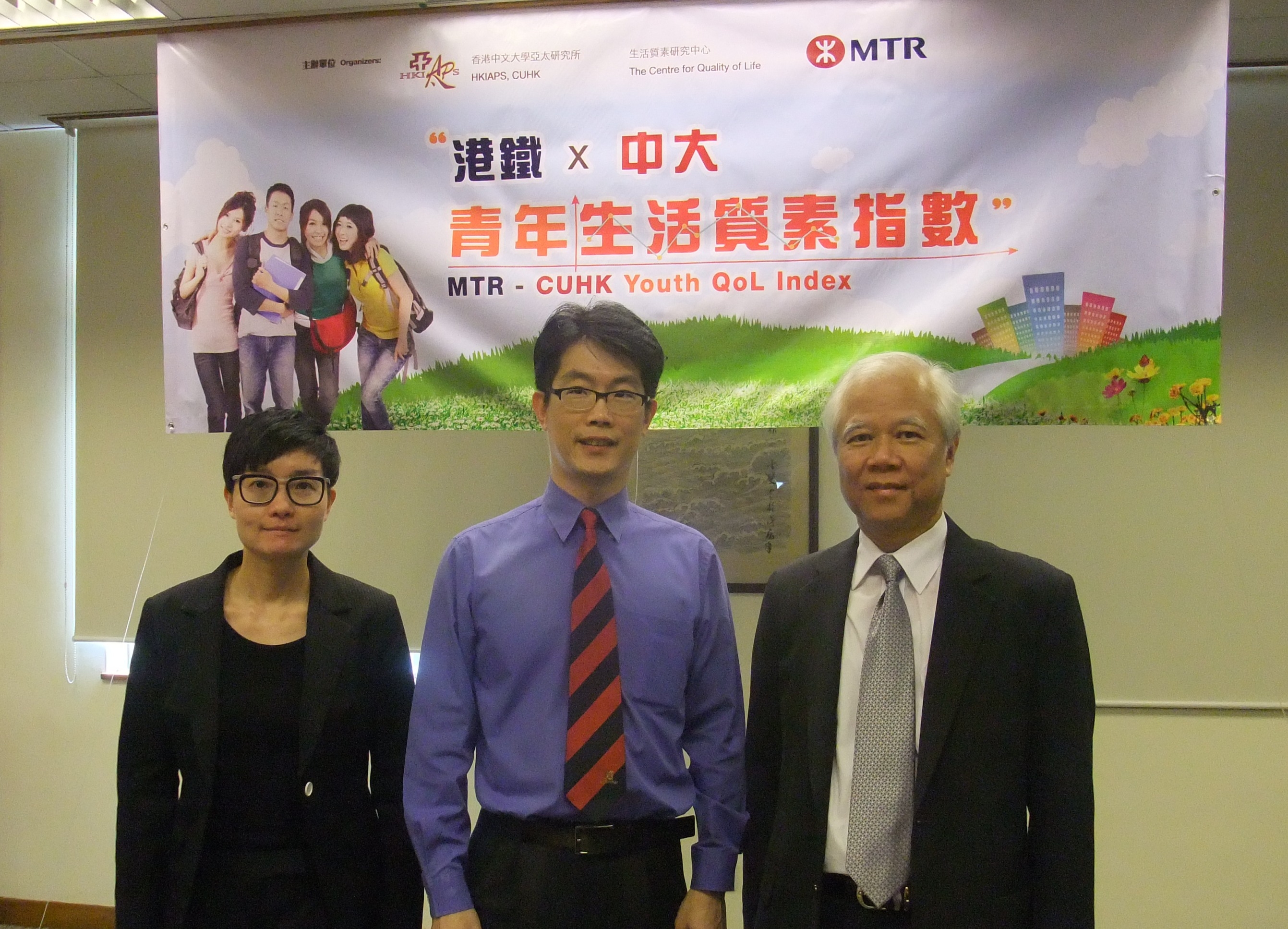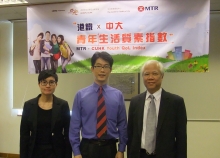CUHK
News Centre
CUHK Releases the MTR-CUHK Youth Quality of Life Index Today
As a new initiative to evaluate and promote the well-being of Hong Kong youth, the MTR-CUHK Youth Quality of Life (QoL) Index of 2013 (the Index) compiled by the Centre for Quality of Life of the Chinese University of Hong Kong (CUHK) is released today (28 May).
This is the first time a composite index has been compiled to measure and keep track of the quality of life of youth in Hong Kong. The compilation of the Index is sponsored by the MTR Corporation reflecting its ongoing commitment to foster the development of the younger generation to meet future challenges. Both the MTR Corporation and the Centre for Quality of Life, CUHK believe that the Index could provide policy makers and the community with a useful reference tool to devise appropriate policies and programmes for the betterment of youth and the society at large. It also enhances public understanding of issues that may affect quality of life of youth in Hong Kong. The first stage of the study will last for five years until 2018.
The Index consists of 26 indicators that are grouped into 8 aspects: Physical Health, Psychological Well-being, Social (including family) Well-being, Economics, Education, Politics, Living Environment, and Overall Well-being. The indicators are selected according to the coverage, measurability, representativeness, andimportance to the quality of life of youth in Hong Kong.
- Physical Health: In general, the youth are satisfied with their health. Half of them do not have adequate rest and lack adequate exercise.
- Psychological Health: The General Health Questionnaire (GHQ-5) designed by Goldberg is used to look into the psychological health of the youth. It is shown that the youth tend to have negative emotions. In general, the youth are optimistic towards their future and life is meaningful to them. They have positive self-image and value themselves, are satisfied with their appearance and work ability.
- Social (including family) Well-being: The youth in Hong Kong are feeling fine with their relationships with family members and friends. They do not find difficulty in seeking help from them when needed. In daily life, they have time to have entertainment activities but sometimes, surfing on the Internet may affect their daily lives. They seldom participate in voluntary or social services. The youth seldom have the experience of being bullied nor meeting with unpleasant experience on the Internet.
- Economics: Hong Kong youth are satisfied with their material well-being and financial conditions. Around half of them believe that their lives in the coming five years will be similar to now or even better. Nearly half of them are satisfied with their development/prospects while the other half think otherwise.
- Education: In general, youth in Hong Kong agree that they always have the opportunities to receive education and acquire knowledge and skills under the education system of Hong Kong.
- Politics: Youth in Hong Kong consider the performance of the Hong Kong Government just marginally passes the standard. They have limited influence on the government’s policies. Government policies and measures fail to take care of the needs of the youth. Half of them believe that everyone is equal under the law.
- Living Environment: Youth in Hong Kong are generally satisfied with their current living environment, as well as the facilities in the neighbourhood.
- Overall Well-being: The ‘Satisfaction With Life Scale’ (SWLS) designed by Diener (1985) is used. It is shown that score in this area is 2.54 (with 1 being the lowest and 4 being the highest) which reflects youth are not overly satisfied with their lives.
The above is the description of the quality of life of the Hong Kong youth in 2013. The Index is set at 100. In the coming few years, the same questionnaire will be used for collecting data. If the Index of a subsequent year is above 100, it means that the quality of life of youth in Hong Kong is better than that of 2013. If the Index is below 100, it indicates that the Hong Kong youth quality of life in that year is worse than that of 2013. If the Index is 100, it indicates that the Hong Kong youth quality of life in that year is comparable to that of 2013.
To motivate Hong Kong youth and improve their well-being, MTR Corporation and the Centre for Quality of Life, CUHK are jointly organising the ‘MTR-CUHK Youth QoL Champions Competition’. All secondary schools were invited to join the competition. Interested schools set up a Youth QoL Champion team and submitted a proposal for organising a project to enhance the QoL of Hong Kong youth. After the first round, 10 proposals were selected and funding support of HK$10,000 will be provided to selected teams for implementing their proposal. After completion of the projects, Gold, Silver and Bronze award winners will be selected from among the 10 proposals. The winners will receive a cash award of HK$20,000, HK$10,000 and HK$5,000 respectively.
For more information on the MTR-CUHK Youth Quality of Life Index and MTR-CUHK Youth QoL Champions Competition, please visit the Centre for Quality of Life website: http://www.cuhk.edu.hk/ssc/qol/chi/index.html.
(From right) Prof. Paul Lee, Dean of Social Science, and Professor, School of Journalism and Communication; Prof. Sai-leung Ng, Director, Centre for Quality of Life, and Associate Professor, Department of Geography and Resource Management; and Prof. Winnie Mak, Associate Professor, Department of Psychology, CUHK.



